Eddie (Ted)
Missionary Boot Camp, 1951-1953
“God listens to young people’s promises,” Milly said as we drove over the rough logging roads to join the men and women dedicated to founding a missionary training camp. “God did not forget our promise at age 14 that we would be missionaries, did He?”
“Why do you think we didn’t become missionaries back then?” I asked.
Milly thought for a moment. “I think God wanted to train us first, me in nursing and you with mechanical things.”
I expanded on the thought, “I think He had to show us that living for Him is more fulfilling than living for ourselves. If we had ‘left everything,’ before we had anything to leave, we might have wondered at some point what we had missed.” The forest around us got thicker as the gravel road turned into ruts and potholes.
“Where are we going to live, Daddy?” Kevin asked.
“We’re going to stay in a big building with other families, and then we hope to build cabins in the woods.”
“Why will we stay with other families?” Clive asked.
“Because we have to learn to love one another and work together as the family of God.”
I started to think about a conversation that Milly and I had the night before. “Milly, you and I have chosen to live by faith, but our children have no choice. They may suffer.”
It had been our last night in the warmth of our home. “Eddie, if God cannot take care of our children, then He is not the God we think He is.”
At last we arrived at the primitive camp, and I parked our loaded car near a small building. It was springtime and wild flowers bloomed everywhere. Our children jumped out of the car and started to pick handfuls. Milly soon had several bouquets and rummaged through our things for a container. “Go to the stream and fill this cup with water to put the flowers in,” Milly sent the children skipping off.
That night all of the recruits gathered and prayed, “Lord, here we are. We believe that you have guided us, and we pray that we will learn quickly so that we can be sent out to the field that is ‘white unto harvest.’”
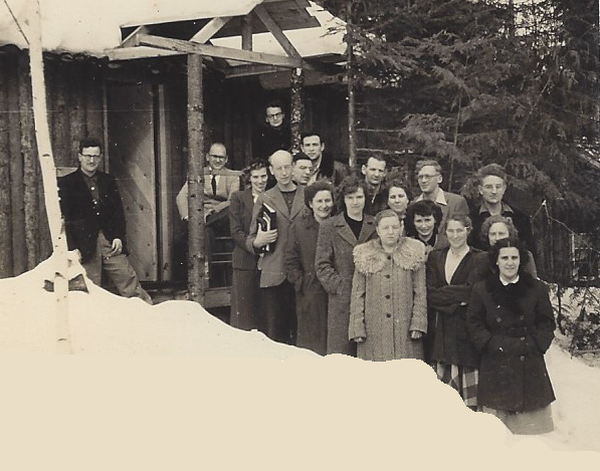
In the months that followed we read and studied the Bible as a group on the grounds of the summer camp. Leroy Larson, the man who had been sent earlier by Paul Flemming, stayed as our camp leader. Many years before, he had been a missionary and was struck down with polio. Now he taught us Bible from the wheelchair. Those who were able worked together to improve the campgrounds, and we all learned to understand and love each other. The atmosphere was alive with the novelty and excitement of training to become physically, spiritually and psychologically ready for the rigors of foreign mission work.
One major challenge was the camp’s water system. A stream, diverted into pipes above the camp, ran to a huge water tank. The water tank, or cistern, was made of giant pieces of sewer pipe, six feet across and four feet deep. Three sections were stacked to a height of twelve feet. When the tank was full it provided enough pressure for the water to reach the faucets and toilets. During the previous winter, the top two sections of six-inch thick pipe had frozen and cracked.
I reviewed the problem aloud to Milly one night as we prepared for bed, “How can I keep the tank full so it maintains enough pressure? I can’t apply cement to the outside of the crack because the water pressure will push it out. The repair must be inside the tank, where the water itself can work for me.” A light clicked on in my head. “Some roofing felt placed against the crack on the inside should just do the trick.” Excited and pleased with myself at this inspiration, I could hardly wait for morning.
After breakfast I asked one of the other men to help me climb to the top of the enormous cistern, to lower a 4x6 piece of felt paper down into the water. We carefully maneuvered it into place over the crack. Presto! It worked perfectly! We sat on the top of the rim, twelve feet above the ground, and watched the water gradually creep up inside.
“You’re a genius, Ware, an absolute genius!” my cohort exclaimed. I had to admit I did feel proud of myself.
“I wonder what else needs improving in the camp?” I asked my new friend. We were discussing various problems, when I happened to notice that the crack had widened! The water had built up and was exerting enormous pressure on the crack.
“Isn't that crack widening?” I asked.
My friend glanced at what we thought we had fixed. “Well, I believe it is!”
The obvious solution was to remove the piece of felt quickly. However, no matter how hard we pulled on the piece of felt we could not remove it. It was lodged in the crack.
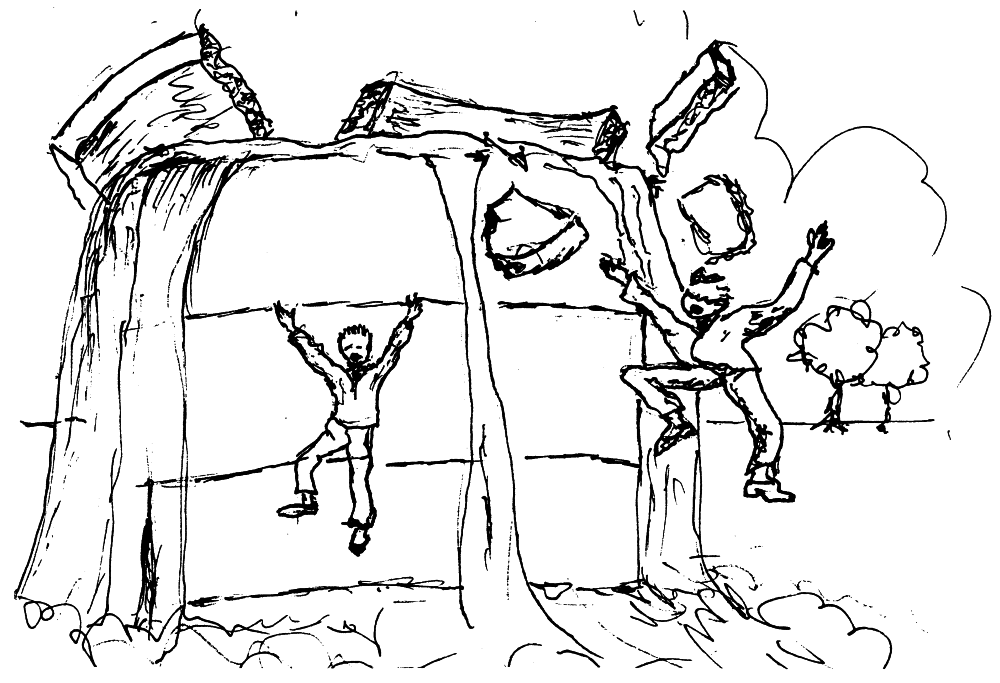
FALLING THROUGH
I nervously suggested, “Well, uhm, I think maybe we'd better get out of here!” We jumped, and in the same instant the enormous top pipe shattered into a dozen pieces, raining huge chunks of cement down around us. Miraculously, we were not hit, but we did get soaked as several thousand gallons of water cascaded through the camp, causing a minor flood.
Sheepishly, my friend and I made our way to the camp director. “There's been a slight accident, and uhm, well, uhm, the water tank burst, and…” We thought that he would dismiss us on the spot, but instead he commented nonchalantly, “We’ll just have to put up with low water pressure.”
His easygoing manner surprised us. We breathed a sigh of relief. The tank was never repaired but my cocky attitude was. I thought long and hard about how I had nearly killed us both. I thanked God for protecting my helper and me and prayed that my attitude of self- sufficiency and bravado would mellow into a quiet spirit. I learned that God doesn’t value the strong and capable, but the yielded weak through whom He can be strong. Our strengths can only be useful to God if they are yielded to Him. As Hudson Taylor, the great missionary to China, said: “God chose me because I was weak enough. God does not do His great works by large committees. He trains somebody to be quiet enough, and little enough and then He uses him.”
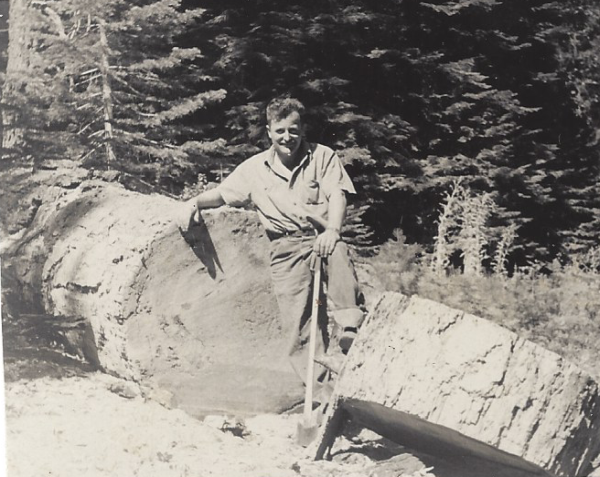
I was learning so much about God and myself that each day was an adventure and time flew by. A few months later 70 acres of woodland near Enderby, B.C., was donated to the mission. It had no electricity, sewer, or water.
“This is perfect,” I exulted to Milly, “exactly what we need. A place where we can learn to work in primitive conditions, just as we’ll find on the mission field.”
“We are nearly out of money, Eddie,” Milly reminded me quietly.
“By the time we help buy the tools we need to build cabins, we will be broke. And won’t that be wonderful! We can start to really live by faith!” I declared enthusiastically.
Milly glanced over at our three sleeping children, and down at her rounded tummy; then she gave me a hug and agreed, “We will trust the Lord.”
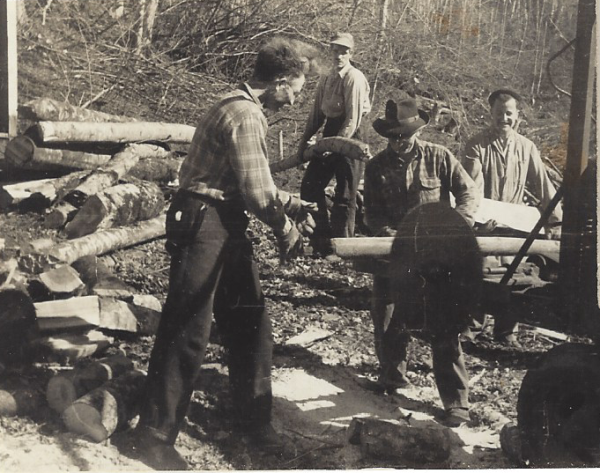
Before we left the Assembly of God summer camp, all the men went to work at the donated property, to prepare it for housing for their families. I noticed that daily we passed lumber mills and logging camps that I had earlier visited as an office equipment repairman.
I suggested to the man next to me, “I could stop in and offer to repair some of their equipment. They normally have to wait for months for a serviceman to come to them from Vancouver.”
“Maybe you could barter for lumber,” he added.
After we arrived at the mission site, we set up a large tent in a clearing. I offered to cook eggs and hash for our supper. As we ate, we sat around a log fire discussing our building plans.
During one of the days that followed I found time to visit one of the local wood mills. I informed the foreman, “I am an office equipment repairman. Do you have need of my services?”
“What will it cost us?” the concerned foreman asked.
“How about some wood? We’re building cabins and could use your seconds.”
“That’s a wonderful deal. You fix our equipment, and you can have all the wood you need!” I carried my tools from the car and immediately repaired a broken typewriter. When I returned to camp with the good news, all of the men rejoiced at God’s provision.
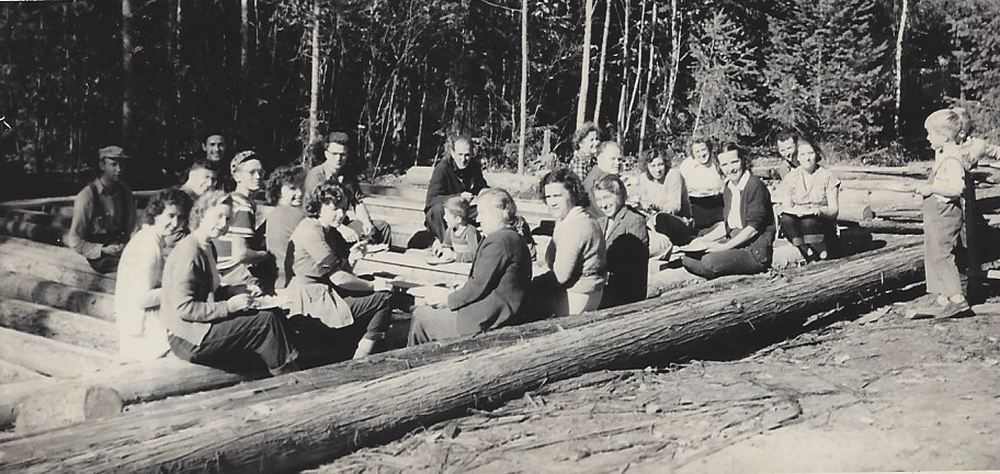
We worked around the clock building cabins and digging holes for outhouses. As soon as our cabin was built, Milly and the children and I moved in. We relied on primitive, basic survival skills: going to the river for water, using candlelight and going to bed early. We planted a garden, but ran out of food before the vegetables were edible. We prayed. A local farmer stopped by our mission to see what all the pounding and banging was. He observed our building skills and offered to compensate us if we built him a cabin on his property. This brought in food money!
Each family was individually responsible for its financial income and spending. The purpose was to simulate living by faith for individual needs on the missionary field. Some candidates were supported by their home churches; others had access to personal savings and income; some lived hand-to-mouth from one gift to the next. However, one young couple received a money-gift. They very unwisely bought filet-mignon steaks and caviar with it! Later that same week, all their money was gone!
During the fall of our first year, none of us had money for meat. One of the men was desperate. “I’ve got to have some meat!” he announced, and initiated a hunting expedition.
“Are you coming, Ware?”
“No, I promised Farmer O’Henry that I would finish his outhouse.”
“He’s been without an outhouse for twenty years. An extra few days won’t hurt him any.”
“I guess not, but I want him to learn to trust my word so he’ll start to believe The Word that I’ve been telling him about.”
“Your choice.” They each left to prepare for the hunt.
Farmer O’Henry was so grateful for my help on his outhouse that he rewarded me with a quarter of a deer! When the missionary candidates arrived back from their hunting trip two days later, empty-handed, they passed our cabin. Hanging from our porch they saw the quarter of deer. They were shocked and told me, “The Lord must have approved of your choice!”
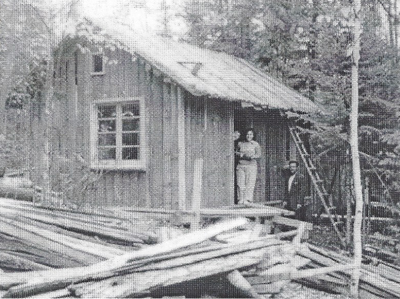
We continued our rigorous work schedule. After a few months of intense effort, we finished the construction of the camp: fourteen cabins, four outhouses and a chapel.
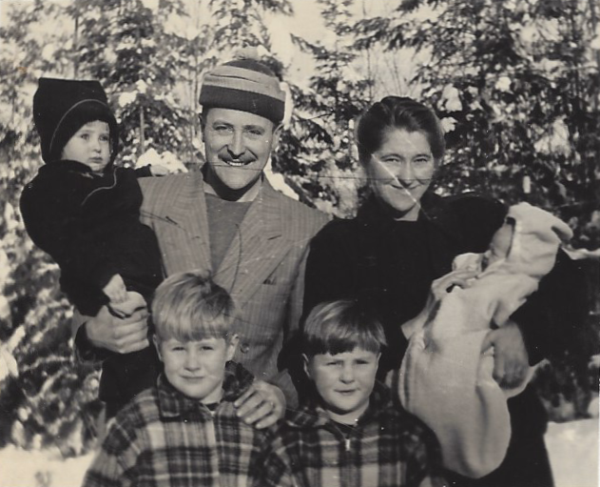
During mid-winter when Milly was due to deliver our fourth child, we drove to a doctor in the nearest town. Dr. Kope was sympathetic to our mission. When he delivered our beautiful daughter, Lorraine Joy, on December 9, 1951, he insisted that we owed him nothing. Our cup was full and running over with joy!
Later, on May 12, 1953, we returned to him for the delivery of our fifth child. As we held Gleason Paul in our arms, we thrilled at God’s grace in our lives. We recalled that Milly had been told that she could not have children. Each of our five children was a special gift. Again, Dr. Kope donated his services. To show her gratitude to the doctor, Milly gave Mrs. Kope her cherished English bone china.
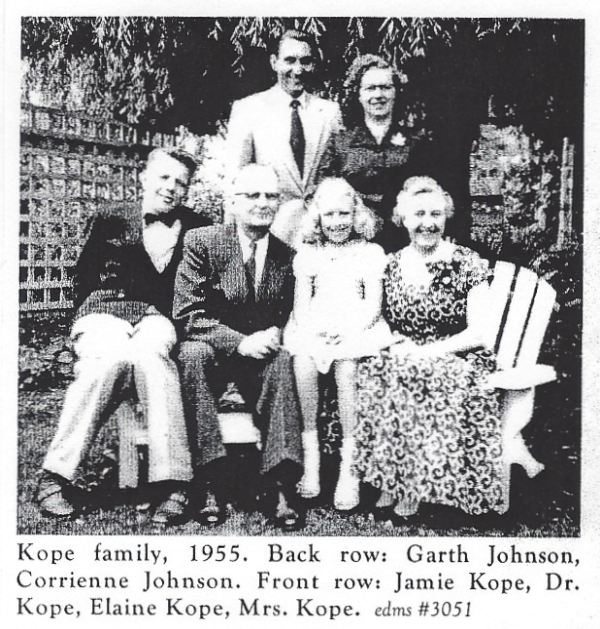
I asked Milly, “Why did you give your china away?”
“Because it meant too much to me. On the mission field I need durable dishes, ones that won’t make me sad if they break.”
As the weather warmed, the garden eventually yielded fresh vegetables. Although our menu was limited, it was nutritious. Milly also baked delicious crusty loaves of bread, with corn chowder, soups, stews, beans, and brawn (the jelly that comes from cooking, then cooling bones). During this time of food scarcity we taught our children, “Waste not, want not.” Waste not included even the smallest crust of bread.
However, from time to time there was an abundance of only one vegetable. For example, one season there was a bumper crop of turnips. We ate turnips until I begged, “Milly, please have the women plant some other vegetable. I can’t stand another bite of turnip!”
Another season, it was squash. We ate boiled squash, fried squash, hidden squash, mashed squash. Yuck! Squash!
We learned also to expect the unexpected. One night someone was pounding on our cabin door. When we opened the door, a distant neighbor nearly fell into the house. “Help me! Please come and help me!” he gasped. “My wife is having a baby. She’s having trouble.” he stammered out of breath from running.
Milly looked at me for my approval, then grabbed her coat and ran out into the bitterly cold night. The man’s old pick-up-truck sped down the snow-covered country road. When Milly arrived, the woman was indeed in trouble, and too far along to be taken to a doctor.
The farmer’s home revealed heartbreaking poverty. Quickly Milly surveyed the scene and planned her strategy. First, her patient, who had already been in labor for 10 hours, was a cooperative, down-to-earth woman; second, the father was a frightened, emotional man with false teeth continually clacking.
Milly turned to him, “Please get wood for the stove. We have to sterilize a bed sheet to put the baby on.”
While he was outside, she found a string wrapped around the top of a bag of flour. She removed the string from the bag and sterilized it in some boiling water, to tie the umbilical cord.
As the sun rose the next morning, the baby started to come. To Milly’s dismay, the baby was in a membrane-like sac. As she removed the sac, to her horror she discovered that the baby boy had a hairlip, a severe cleft palate, and its face was flat. Milly looked up at the father who was watching her. His face turned ashen. She wrapped the baby carefully in the sterile sheet. Turning to the patient, Milly was alarmed to see that the woman had started to hemorrhage. She laid the infant in his father’s arms and worked to save the mother. By 8:00 am the snowstorm had passed. Milly felt safe to bundle her patients into the pick-up truck to drive to the doctor in town.
“I can do nothing for your child,” sorrowfully the doctor informed them. “He will live only a short time.” The devastated parents took the baby home. They fed him with an eyedropper throughout the day and night until he died at three months. Following his death, the farmer came and banged again on our door, his hat in his hands. “Would you make a coffin and bury our baby?”
“Of course we will. We’ll be over as soon as it is morning.” I got up early and made a casket of clear-pine lumber. Milly and I helped to give the sweet little fellow a proper Christian burial under a lone pine on a hill on the farmer’s property.
A few days later the farmer appeared at our door again. “How much do I owe you?”
“Oh, you don't owe us anything. We do this for Jesus. We don't charge anything.”
“Well, I've got to pay you somehow.” He appeared a little nervous, and his teeth started to chatter. “I know,” he said, a light coming to his eyes, “I'll deliver milk, eggs, and butter every week and sometimes other things, but always eggs, milk and butter.”
Our heart ached for the man. I could hardly speak for the lump in my throat and holding back tears as he patted my baby’s head and left for home. What a blessing he was to us as we saw our children thrive with the nourishing food he lovingly brought.
Some time later, Milly was alarmed by Kevin and Clive’s cries. “Mummy! Come quickly! Heather’s hurt!” Kevin and Clive announced one afternoon. Milly grabbed Joy under one arm, and Paul under the other, and ran after them.
“Where is she?”
“We were climbing up on the water truck, and she followed us. Her hand is stuck on the hooks on the side of the truck.”
Reaching the central clearing, Milly could see Heather screaming and thrashing her free arm and legs as she hung, impaled by her right hand, from the side of the tall truck.
I also heard Heather’s screams from the other side of camp where I was at a Bible study and came running. As I lifted Heather, Milly gently slid her hand off the hook. She wiped the blood off to see the extent of the damage, and observed sadly, “It’s got to have stitches.” We tried to soothe Heather as we drove to the doctor’s office.
Following this painful accident, Heather accidentally set fire to our cabin. The fire did little damage to the cabin but Heather’s right leg was severely burned. Milly applied first aid compresses while the entire camp assembled to pray for her. I held her until she fell into an exhausted sleep, then knelt by her bed praying until daybreak. To our delight, Heather wakened early singing, the gauze from the bandage trailing behind her as she walked effortlessly around the room with her doll. God had healed her. Hallelujah!
As our family grew, we built a larger cabin out of the same unfinished tongue-and-groove siding. We packed sawdust between the exterior and the inner walls for insulation running the stovepipe through the insulation to the outside. During very cold weather we kept the stove burning all the time. One morning, Milly saw smoke and then a flame coming through the wall. She rushed the children outside into the freezing air, shouting, “Fire! Fire!”. Our friends ran from all directions, slipping on the icy ground as they carried buckets of water. Through team effort, they were able to extinguish the flames. The cabin was not destroyed. We were able to move back into the cabin the same night. After that incident we were more cautious, not allowing the stove and stovepipe to get too hot.
Milly always amazed me with her unflinching courage and willingness to endure hardships. Her positive attitude was a constant inspiration to me, as well as to others. She washed our clothes on a washboard in the cabin, and then hung them out to dry, or freeze, if it was winter. Believe it or not, stained cloth diapers whiten when they freeze… some comfort when you are out of diapers and need a dry one to diaper a baby!
Not only were we involved in food and shelter survival for our children, but we were also supportive of their education. Kevin and Clive attended a school in the nearby town. They had to walk about a mile to catch the bus. Sometimes they noted wistfully that their school friends used special lunch pails, and their sandwiches were wrapped in plastic. We could not give them these luxuries but they certainly never went hungry for food or love.
In addition to our caring for our family, some of our training required our visiting neighbors and sharing God’s love. Milly chose to go to the homes of neighboring farmers. “Eddie, it was disgusting,” she said when she returned. “The first farmer I visited with is living with a woman who is not his wife, and worse yet, it doesn’t even bother him. I stopped at another home that smelled so bad that I held my nose as I knocked on the door. An old woman invited me in, but her place was such a mess I couldn’t sit down. Come to find out, she’s a retired teacher! She looks like a witch!”
“Milly, on the mission field you’ll see a lot worse. God came to save sinners, not perfect people.”
Our camp leader, Leroy Larson, preparing us for our mission, often taught from the book of Romans. He always emphasized the grace of God. Among us were Baptists, Methodists, Presbyterians, Catholics, Mennonites, and Pentecostals. Mr. Larson always avoided controversial issues, and no one was allowed to proselytize other group members to his church doctrines. We were all there with the goal of bringing men and women to a personal commitment to God.
During these sessions one issue that did precipitate a lot of discussion, however, was the “fall-aways” (those that believed that you could lose your salvation by your behavior or lack of it), versus “once-and-for-alls” (those that believed that you could not lose your salvation no matter what).
To address this issue, Mr. Larson read Romans 3:10, ‘There is none righteous, no, not one.’
Then he asked us to turn to Romans 3:23-24, “For all have sinned and come short of the glory of God; being justified freely by His grace through the redemption that is in Christ Jesus,” Romans 4:16, “Therefore it is of faith, that it might be by grace…,” and Romans 5:20, “But where sin abounded, grace did much more abound: that as sin hath reigned unto death, even so might grace reign through righteousness unto eternal life by Jesus Christ our Lord.” As Milly left the early morning study session, she walked with her sons to their bus stop. On the way back she was reviewing the lesson of God’s grace. Suddenly it hit her, “It’s all finished! I don’t have to work for it. I’m not going to lose my salvation!” she sang out to the trees around her. My dear little wife then admitted that she joyously danced, right in the middle of the road!
One day I arrived home from a day’s work and found Milly beaming from ear to ear. “Remember that woman I called a witch? I took her a hot loaf of bread today. She let me in and shared some of her past experiences. No wonder she’s a recluse! Before I left we cried and prayed together.”
A week later I went with Milly to visit the old woman and found a tidy place and a happy lady. After her counseling session with Milly, her life had turned around. Her home was clean and neat and she was completely changed. Her countenance radiated joy and peace.
I also met the man ‘living in sin’ that Milly had told me about. I saw him walking down our road. “What’s happened to your wife?” he asked.
“What do you mean?”
“I mean that she’s changed! The first time she visited us she was about to pray fire and brimstone down on me and my woman. Now she’s almost convinced me to get married, and she hasn’t even brought the subject up.”
I could see that the training was working. We were all becoming more like Christ and miracles happened. As time passed, some of our candidates felt they were ready and left for their mission field. Each time someone left, we all prayed and sang:
One of the candidates who left, Paul Gifford, had visited our cabin often. A vibrant Christian, he left us to work with the American branch of our mission camp in California. Soon after, we received a letter saying that he had died while fighting a forest fire. “What an incredible loss to the work of God,” I mourned. “How I look forward to the day when we meet again in a better place.”
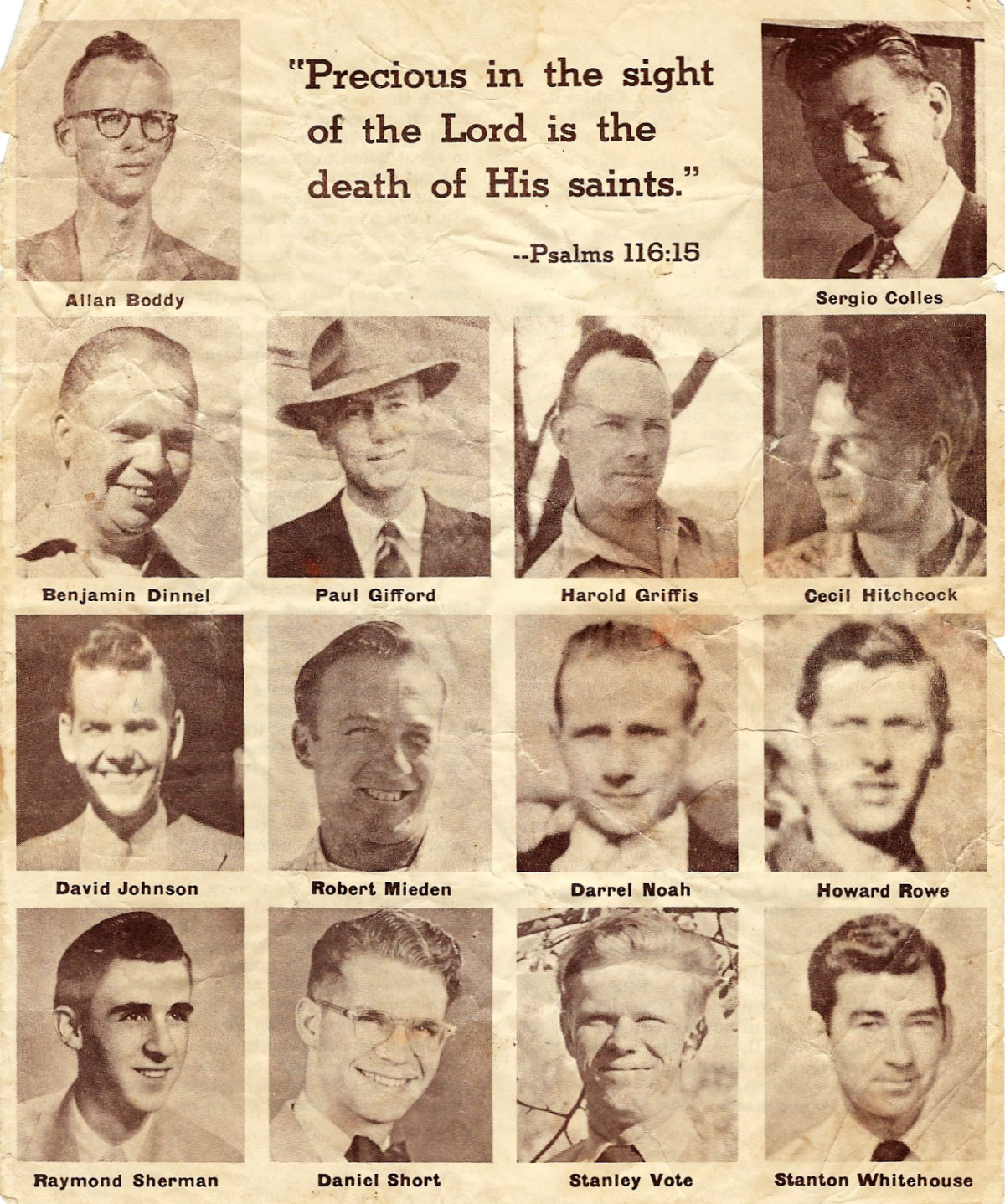
After 18 months in the Canadian boot camp, we also moved to the Mission camp in northern California. A long, dusty road led to the camp. Rows of cabins, an airstrip, a store and a school for the children sat huddled among the tall green pines. My assignment was to teach building skills with other survival strategies and Milly was given charge of the infirmary.
Soon after our arrival, one young candidate fell from a telephone pole and was brought to Milly unconscious. Deciding that his case required immediate medical attention, she decided to rush him to the nearest doctor one hundred miles away. We prayed all the way. When we arrived with the unconscious patient the doctor started to stitch up the gash on his head. As the doctor was stitching, the young man regained consciousness. He confronted the doctor: “Are you going to hell or heaven, Doctor?”
Shaken and unsure how he should respond, the physician asked, “Is he always like this, or is he irrational?”
“He's always like that,” we assured him. Since the doctor found no other problems, we drove him back to camp rejoicing.
Milly had another life and death challenge that many women fear. Sheryl Fleming, the widow of Paul Flemming, came to Milly, having discovered lumps in her breasts. She was prayed for but a few weeks later she reported that the lumps were no smaller. We were all very concerned and encouraged her to consult a physician. Milly accompanied her to Sacramento where the doctors decided that they would remove the lumps, examine them for cancer, and then proceed according to the diagnosis.
On the day of surgery the surgeon discovered that the lumps were most unusual, so much so that he called in another doctor for a second opinion. “Look at this! I've never seen lumps like this before! They're all sort of dying from inside out.” The lumps had atrophied, and had shriveled! Milly was jubilant with this unexpected report.
Many experienced missionaries challenged us. They shared how they were able to meet impossible obstacles by faith. When one candidate left us to go to Venezuela, the Venezuelan immigration office refused him entry into their country. “Nobody needs you here,” the administrator said, “unless your religion can help my brother. He is in the insane institution. If you can help him, I will sign the permission for you to stay.”
The missionary had never dealt with mental problems before, so he stepped aside and prayed. “What shall I do?”
The promise of God’s Word came to his mind: By my stripes you are healed. On the strength of that promise he bowed his head and prayed out loud for the man’s brother.
A week later the missionary returned to the immigration office. When he entered, the administrator called him over to his window. “My brother is home again! The doctors cannot explain why he is better, so it must be your prayer. You may enter my country. We need you.”
Another one of our candidates went to Sumatra. She, too, was forbidden entry into the nation that she felt called to. Day after day she sat on the doorstep of the government building until the officials tired of seeing her there.
“If you want to go into the jungles so bad, go!” they said.
So she went with only a tiny native woman for company. One day she became very ill with dysentery, she longed for only a piece of bread. The native woman companion had gone into the village and was walking past a Dutch official who had traveled there. Unexpectedly, he gave her a loaf of bread! The companion didn't even know what it was, but she returned to the missionary and gave the gift to her.
The missionary, Kathy Hawthorne, wrote home: “God knew that I was in the jungles, desperately wanting something from home, and the Lord put it in the jungles for me!”
Before Kathy left for Sumatra, she was invited as a guest speaker to 100 students at 9 o'clock each morning for a week. However, she was suffering with a severe case of laryngitis, and could only make a whistling sound. Miraculously, at nine o'clock each morning, the Lord restored her voice. She spoke for an hour, and when she was through, her voice was gone again.
All of these people and their testimonies strongly influenced our lives. We realized that nothing is impossible with God. Nothing! We can trust Him, depend on Him, love Him and believe Him for anything.
Following an exciting year in California, we were asked to return to the camp in Canada. At the Canadian border an officer asked to search our car. Milly had just changed Paul’s diaper and I had gingerly placed it in the back to be washed later. When I opened up the back of the car, the officer took one whiff and said, “That’s all right, just go ahead!”
Back in Canada at the camp in Enderby I was assigned to travel all over Canada, recruiting men and women, in church groups, and individuals, to become missionaries. On one occasion, a Christian lady who owned a restaurant was very kind and generously served me a free steak. When I said goodbye, I challenged her to the need on the mission field. Shortly afterwards she sold her restaurant and became a missionary. A taxi driver also accepted my missionary challenge. Dozens of others, one by one, heard God’s call to follow Him.
During this time, on one occasion I was asked to speak at a town many miles away. After checking my wallet, I found only a few pennies. That evening Milly and I attended a prayer meeting at our church. Rather fond of making fleeces, (like Gideon in the Bible,) Milly asked God to show her that He would provide for my trip. In the middle of the prayer meeting she was tapped on the shoulder. “The Lord told me to give you this,” a man said, as he placed a five-dollar bill in her hand. Needless to say, I went on the trip. However, I returned with more money than I had before!
During one of my trips, I was asked to take a candidate, Jon Cowpersmith, with me on the road. He was a brilliant student who came to us from a Pentecostal Bible School. He preached and taught better than any of us. Being single he was housed in the boys’ dorm. Each morning he rose early and sang, prayed, and talked in tongues. During the day he peppered every conversation with “hallelujah” and “praise God.” At the end of his prescribed year of training, the concerned camp director refused to release him to the mission field.
“You are fanatical, Jon. You must stay in training for another year. Hopefully you will become more balanced.”
During that year there was a devastating forest fire, and every able-bodied person was called upon to extinguish the fire. As a group we strenuously labored all night. Jon not only worked along with us but he also preached and worshipped God all through that difficult assignment. His enthusiasm kept all of our spirits up. The forestry department told us that if we had not participated, our camp would likely have been destroyed.
At the end of Jon’s second year, his zealous behavior had not changed. The camp director came to me with a worried frown. “Well, uhm, we can't keep Jon here forever, so uhm, let's uhm…Ted, I want to send him out with you on one of your trips across the country. By the time you're through, let’s say you’re gone a month or two, your balanced religious behavior will have rubbed off on him. Then perhaps we can send him into the field.”
The morning we left, Jon sat in the car long before I was ready to read his Bible. As soon as we got out of the camp gate he said, “Listen to this, Brother Ware, oh, praise the Lord, praise God, this is wonderful!” And he proceeded to read the first part of Psalm 63:
At this he raised his thin arms up, closed his eyes and sang a chorus, parts of it in something other than English, and we hadn't reached the bottom of the main road yet! I thought, “Oh, no. This is going to be some trip, this is.”
I drove and he sang, read the Bible, prayed and talked in tongues. This went on for a couple of months. Everywhere we went, he knew somebody. When we drove to the prairie, Jon said, “Now, Brother Ware, there's a couple of sisters that live just thirty miles from here. They've got a little church, and I know they'd be glad to see us. Why don't we stop and see them?”
Well, it was part of my job to promote the mission, so I said, “Well, yeah, sure, let's do that.”
As time passed, I came to some startling conclusions. I realized for the first time, that there are two kinds of Christians: 1, Christians like me and my affiliation, who looked absolutely serious while the call for missionaries was shared with them. They were appreciative, unmoved and unexcited. When the offering plate was passed, we received a token response. That offering was our only financial support for our mission. On the other hand, 2, Christians like Jon and his affiliation sat bright eyed, enthusiastic, responsive and they were givers! They always gave us a generous offering. The longer I observed these Christians, the more I was drawn to these “Full Gospel” Christians. They seemed to have life and vitality in everything that they did. I was most impressed with their singing and testimonies. They told of miraculous healing and answers to prayers.
During our meetings, I observed one old couple hugging each other and crying for joy, “My wife was given up by the doctors. She had cancer all through her body. I took her on a stretcher to a Brother Branham meeting. We got there late and sat in the back of the congregation. To our surprise this minister called her by name, told her where we lived, and announced that God healed her of cancer. Sure enough, she bounced off of the cot, and hasn’t been ill since. The doctor can’t find a trace of the cancer.”
That night as I lay in the comfort of a bed in one of Jon’s friend’s home, I could not sleep. Jon was in the other single bed in the room. I whispered, “Are you awake?”
“Yes, I am.”
“Tell me more, Jon.”
“Well, Acts 2:38 and 39 says, the promise is unto you, and to your children, and to all that are afar off, even as many as the Lord our God shall call. Healing and the baptism of the Holy Ghost go hand in hand. God said they were for us, and there’s no place in the Bible where He retracted the promise.”
“That little couple sure are grateful to the Lord for her healing, aren’t they?”
“Anyone can believe for healing. It doesn’t take a special minister.” Jon told me many stories of his family, and people he knew. Some had been healed in special meetings, others by simple prayer.
After Jon fell asleep I thought about myself. I couldn't preach or speak like these people. They had more to say about God than I did, and I was a full time Christian worker. I decided that it had something to do with this ‘baptism’ that they talked about. Of course, I believed I received the Spirit when I was born again, but there must be some further experience that I was missing.
On our way back to the camp, two and a half months later, I was relaxed and delighted to be headed back to Milly and my children. Part of the journey took us around Lake Okanagan, which is about seventy miles long. The dirt road around it was narrow and full of curves. As I listened to Jon praise God I was overcome by a wonderful, sweet feeling. I just felt good inside, so I said to him, “Jon, I think I'm getting blessed!”
Jon looked at me, and said, “Well, glory! Hallelujah!”
I responded, “Yes. Glory. Hallelujah.”
To which he said, “Bless the Lord!”
“Yes. Bless the Lord,” I replied. The pleasant feeling grew until I was filled with such joy that I was no longer aware of the road and started to praise God! There were no speed signs, and the car flew faster and faster around each curve. We came to a one-street town, slowed down and decorously drove through it. As soon as we got to the other side, off we went again!
John began to speak in tongues, and lo! and behold, so did I! I had this marvelous experience of elation and anointing that I'd never had before. My heart filled to overflowing with love and concern for others.
When we got to Lake Kilowna we stopped to drive on a ferry. I got out of the car and walked over to a group of Indians. I began to preach and witness to them. They probably thought I was crazy, but I couldn’t resist sharing the joy I felt inside. We then drove on the ferry, crossed to the other side and proceeded the last thirty miles to the camp.
When we pulled in about dusk, I jumped out of the car and rushed to Milly. “Darling, you won’t believe what’s happened!”
“What’s happened?”
“I’ve been baptized in the Spirit!”
“That’s wonderful! Praise the Lord!” she said excitedly. “And you're scheduled to speak to the students tomorrow morning!”
The following day I gave a report of our trip and ended with my experience in the car. The leaders went from being quite happy, to being quite somber.
Following the meeting, the camp leader called me in to his office. “Now Ted,” he used my preferred name, “we sent you to influence Jon, not for him to influence you.”
“Yes, I remember. I did not ask for this experience, other than praying to get nearer to God. I’m sorry that it upsets you, but I cannot disclaim something that has had such an effect on me.”
“If you continue with it you will be on your own.”
“Let it not be said when we stand before God, that I did not trust Him on my own.” I felt a peace that passed any understanding I’d ever had.